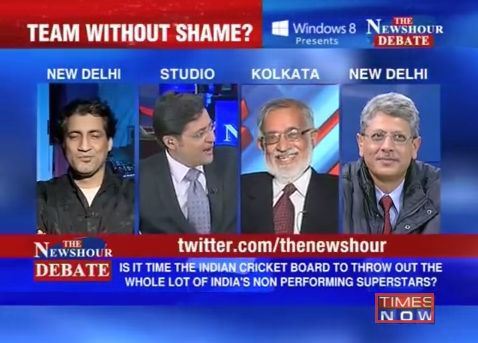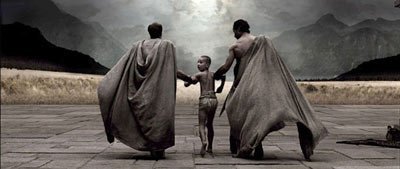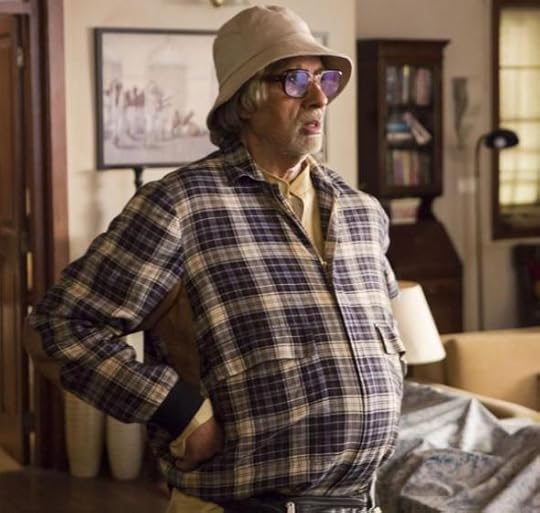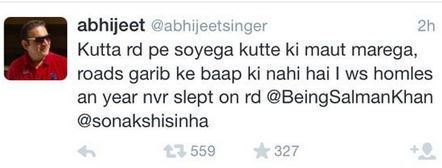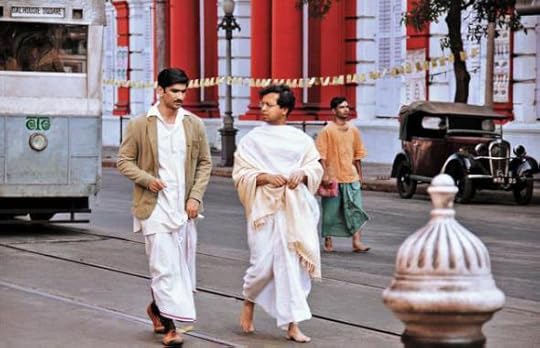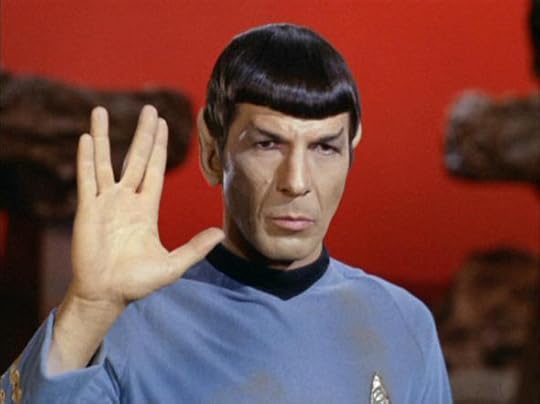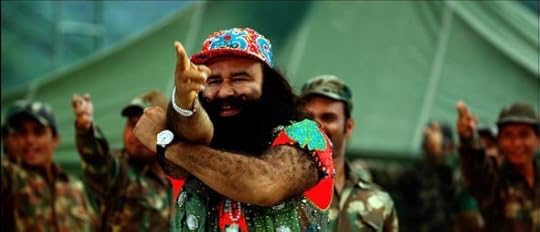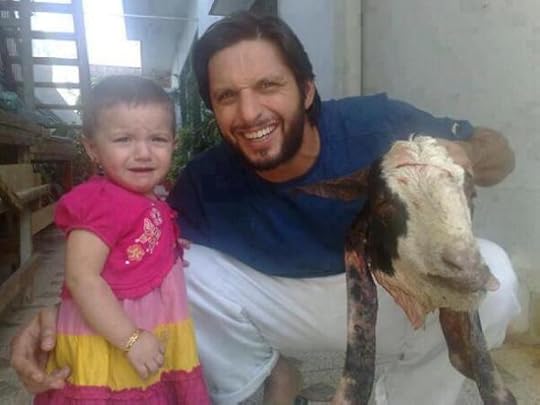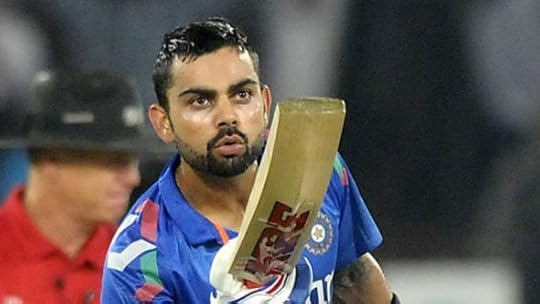Arnab Ray's Blog, page 16
June 23, 2015
Club vs Club
Someone seriously needs to tell Mr. Bhimani that he does not need to laugh derisively every time a panelist on Arnab Goswami’s show says something in favor of Dhoni. It is natural to feel insecure given that Yograj Singh is a Patiala peg away from replacing him on the one place that still gets him in front of a camera. But it is safe to say that Mr. Bhimani’s animated, though overwrought (in a Kareena Kapoor in a “Main Prem Ki Deewani Hoon” way) Dhoni-baiting has cemented (yes note the ironic use of the word) his slot in Arnab’s noisy menagerie as the go-to-act for anti-Dhoni vitriol, and I am happy for him. Now if he could only go a little light on the ketchup.
Fulminating over Arnab Goswami’s show is an exercise in recursive hypocrisy and I am not going to do that, mainly because I enjoy watching its hashtag-ridden “what angle will get me maximum TRP” synthetic outrage. With its narrative of national shame and epic betrayal after every loss, however the cricket segments have become incessantly grating, and by the stellar standards of his show, that is saying something.
Yes, Mr. Goswami. The Indian players give more priority to IPL than to playing for, what you call, the country. Not because they are not patriotic, or rather any less patriotic than you or me, but because they are human beings who react to incentive structures in the same way that, once again, you and me would. And this lie that they play for the country needs to be put to rest once and for all. They play for a private club BCCI, which owns a product called “Indian cricket team” (BCCI itself has claims that when it suits them) and what these so-called mercenary Mir Jaffars are guilty of doing, if of anything, is prioritizing one club over another. It is not their fault that because of canny advertising, large sections of the population believe that somehow putting on a blue cap is like joining the army, and if these players, intelligent men as they are, choose to, by virtue of being in the system, not drink the Kool-Aid (or rather Pepsi, official sponsor of Team India), allow them the cynical privilege of doing so.
The way I see it, the Indian players are like farmers. The main cash crop grows for two months in April, and in order for the field to be fertile, they need to grow some other crops the year around. So of course they don’t call in sick and tired during IPL and their weary limbs and jaded minds complain when they are playing in front of hostile crowds, and then losing. That’s called being human, and it’s not like they are running over pavement dwellers.
But they should play Ranji trophy, they should play Test cricket and IPL should be banned, say ex-cricketers on the panel at Times Now, who are really pissed because they only played Ranji trophy and Test cricket and there was no IPL for them.
No dear sirs it’s not BCCI that’s destroying the game. It is a very rich corporation, that’s beholden only to those that profit from it, and it is as murky and transparent and honest and as in bed with politicians and power-brokers as any other corporation of this size. While we may rant and rail at its greed, we should also do well to remember that it is perhaps because it is a private corporation, that the government has not gutted cricket yet, in the way they have done hockey and every other sport.
And thus being the canny businessmen they are, the BCCI is not killing “the game” because it’s fun.
They are doing it because that is exactly what their customers want.
Their customers. Us.
We don’t want to see Ranji trophy, we don’t want to see Test cricket. If we did, that would be where the money would be, and the BCCI would not have to re-engineer their product.
Not that the Times Group does not know that, it’s why they have Poonam Pandey and celebrity cleavage shots rather than serious long-form journalism, because people read the former and pretend to have read the latter.
And it’s why Arnab Goswami is still an anchor with his own signature show as opposed to someone who India could truly trust.


May 28, 2015
On Marks and Board Exams and Life
It was called agoge in ancient Sparta, the inhuman education and training regimen that little boys were subject to in order to make them impervious to hunger, fear and pain, a regimen that included having boys fight boys to death so that the weak may be weeded out.
Or as anyone who went to school in the late 80s and early 90s in Bengal would say, school life.
Suicides were common, and so were heart-attacks and nervous breakdowns. Four successive days of two papers of a hundred each was considered to be perfectly humane because, how else, were children going to handle “the real world”? I came from a school, particularly notorious for what was just known as “The Pressure”, where most of us were made to fail in our maths half-yearly in class eleven, because and this was the stated reason, the class ten scores had given us whippersnappers an inflated idea of our intelligence and we needed to be cut down to size.
And if you thought the teachers were bad, you hadnt met the parents. Even today as I close my eyes I can see them. The thirty minute break between paper one and paper two, and there they were, like heavyweight boxers in their corners after a bruising fight, sitting catatonic their heads to the side, one parent putting an ice pack on a head or stuffing yogurt down a barely moving mouth while the other, like Micky from Rocky, giving last minute sparring advice “Answer the objective type first” and “Don’t, no matter what you do, touch the short notes” and “Last time, what’s the length of the Nile? Oh-ho that’s Amazon you stupid boy”. Exam over, and they come out, some elated, some deflated, some with their heads in their air and some sinking into the earth, and parents swooping down from all sides, holding them by the forearms, “What answer did you get for Question 3a? Somnath and Sudipta got 5. What ! You got -32? ” Hot summer afternoons, corpulent aunties in sleeveless blouses, sweat streaming down their flabby forearms in torrents, copying “notes” using the backs of other aunties as tables, hounding the mothers of the “good children” with earnest queries like “Which coaching do you send her to?” And finally small boys and girls, with heavy bags weighing them down, being harangued publicly as they walk away towards God-knows-what at home, for doing “short notes” or for forgetting that when you remove the bracket and there is a “minus” before the bracket all the signs change.
Aah the memories.
Some of this performance obsession one could explain as the expression of middle-class insecurity in a state in the grip of generational despondency. Unless you were at the top of the class, or at least at the bottom of the top, you could not expect to become a doctor or an engineer, leaving only one option open, that of being a CPM cadre, to live a life of plastering posters on walls, playing carrom, roughing up opposition, and shouting “Inquilaab Zindabad” for the promise of a packet lunch of a banana, a toast and a half boiled egg at Brigade Parade Ground. Justifiably, parents felt terrified of what would happen if the report card had “Fair” or “Very Very Fair” written in the dreaded box (this was one place where fair was not lovely) and this terror of becoming the average seeped in through to their children, till they would forget what they were scared of except that they were scared of something.
And then there was something else.
The outlet afforded by sharing pictures of happiness in foreign locales through DSLR cameras on Facebook and envious “Liking” by peers was not afforded to parents of our generation, who stuck in joint families, middling incomes, high taxes, Webel color TVs and occasional visits to Puri or Digha, had only their children to show as monuments to their awesomeness. Easily measurable and totally ordered, marks became the sole focus of one-upmanship (“My son got two marks more than your daughter”) and “We push him hard because we love him” the comforting narrative justifying the pursuit of happiness through the engendering of social envy.
Here’s the thing.
None of it mattered.
More than twenty years after I left school, I look around at those that shared my bench or my tiffin. And, in my most unscientific and mostly Facebook-friend-list-based study, I find it that almost everyone has done very well for themselves. They took different routes to get to where they are, some didn’t get to do what they wanted out of school (like me) or didn’t get into the college they wanted to get in, but everyone, almost everyone, made it to roughly the same place. Even there, the ones who did better than the others, weren’t necessarily the best in class, and that boy that almost always used to get hundred in Maths and never made a silly mistake and appeared on Doordarshan after “ranking” isn’t the guy who is driving the Audi or posting seven pictures of him and his wife having an expensive dinner at Cannes. I don’t know what it is that gets people to where they are—inherent ability, good health, confidence, luck, good choices, solid relationships, an MBA degree from a top school, or a combination of the above, but I know what doesn’t.
Marks.
Which often makes me wonder, as I grow old and value the time I have left in this world that much more, what a waste it has been, the emotional energy expended obsessing about scores and ranks, hours lost trying to be a hard-drive of useless knowledge when I could have spent that time doing things of the kind I can never do again, and competing with people I was never really in competition with. And what’s even worse is that it has stayed with me, that terror, so that even today, decades after it ceased to matter, I still have intense exam nightmares, and I sit up straight wondering how the fear of exam-failure has become a part of who I am, and all for nothing.
I am not much the advising man, for I know little about life, or I would have perhaps done better for myself.
But all I want to say is that marks are good, and if you got a boat-full in your board exams, great and congratulations.
But if you have not, then let me tell you with the advantage of hindsight, that it won’t matter. Not in the long run.
The most important thing to remember is you have time on your side.
And once you have that, nothing else matters.
You will find your way.


May 20, 2015
Of Potty and Parenthood and Piku
[Has spoilers]
Piku is a good film. No this is not me trying to damn with faint praise. Piku *is* good. Even more than good, I would say it is courageous. In a world of cookie-cutter behemoths , to invest in a film that is paced slow, driven by characters, and set in a non-Oye-Oye-Shava-Shava socio-cultural milieu, requires commercial cojones, and props to everyone associated with Piku, from the big B and the Choice P to the director to the guys who actually put money behind it, for providing us with something that I would not hesitate to use the term ‘risky” to characterize.
However it is not great. But it could so very well have been. It comes very close, several times as a matter of fact, to touching something that is deeper and darker and universal, but almost, whether intentionally or not I cannot say for sure, it draws back into a comforting, crowd-pleasing but ultimately unsatisfying green zone.
But before I explain this rather strange criticism, of evaluating something on the basis of “could have been” than “what is”, a word or more than a few about potty humor. Scatological humor, when played for shock value, is something I find most trite and tiresome, especially since I am not ten years old any more. However here, it seems to serve a purpose, that of establishing something defining about the psychology of Bhaskar Banerjee. It is quite common, at least for people his age, to be obsessed with their own excretions and their body in general, and not because they find it funny in the way a pre-teen would, but because their bodies react to unpassed stool in a way very different from how they would have at the age of twenty, leaving them, to use the perfect English word in this context, “bilious”. And it’s not just , and here Piku gets it pitch perfect, a mere physical malaise. With very little to otherwise occupy their minds and with nothing left to achieve, no office to go to, no children to get ready for school, old people turns inwards, obsessing about motions and the changing color and consistency of their stool in a way that becomes almost a psychological affliction in itself. Now I do not have exact data for this, but it could be that this is particularly acute for Bengalis, obsessed as we are about catching cold and stomach bugs from youth itself, which explains the ubiquitous presence of the monkey cap, the strips of Gelusil and the Mahendra Lal Dutt umbrella in the Bengali life kit, and this fact in itself makes Bhaskar Banerjee an entirely believable creature. His potty-fascination then becomes a metaphor for his self-obsession, rather than an egregiously offensive plot-device played to get titters from an audience, forming a starting point for his character arc. It’s this arc where Piku works spectacularly, ending as it does with Bhaskar Banerjee finally liberating himself from the bounds of his own device, by cycling about in his old city and partaking the oily snacks that every Bengali in his heart craves and it is precisely because the climax has no drama, no impassioned tear-jerking, no sweeping background score, that it brings a lump to the throat, in the way only something this real can.
Which brings me to the daughter, Piku, played with great understatement by Deepika who is surprisingly becoming the best actress of her generation (who would have thought after “Om Shanti Om” that this would happen?), and her relationship with her father, and here is where my problems with the film start.
To put it simply, it is way too sunny. The conflict between the father and the daughter is too polite, too low intensity, too gentle to be even mildly realistic. Or rather mildly interesting. So you have the father telling prospective suitors that his daughter is not a virgin, and the daughter is only slightly irritated by her father’s eccentric honesty. The father’s fastidiousness leads to the hired help quitting and once again, the daughter is mildly miffed. There is never a confrontation between the two, never anything resembling real tension. Not once does she explicitly, and with great passion, raise the very real possibility that her father is sabotaging her relationships intentionally, so that she stays and cares for him, he being someone who does not trust professional caregivers.
Because this happens. All the time. Parents strangle the lives out of their grown children, because they expect to be looked after, and children soldier on, often reluctantly and at great cost to their own future happiness.
There is tension here, there is emotional violence and blackmail, and yet bizarrely there is also sometimes love, sacrifice, and genuine tenderness.
But yet we never see this kind of conflict in the movies.
In the black and world of popular Hindi cinema, the parent-child relationship has been fetishized to an extent that the only characters that may be shown are cardboard, either Alok Nath’s half-crying smile and Nirupa Roy’s desperate eye-fluttering or the evil smirk of the son that abandons his parents, usually under the influence of the modern “bahu” (Rajesh Khanna’s Avtar).
And that’s where I felt Piku would bring some welcome nuance, a touch of darkness in the light of comedy.
Not that one doesn’t understand why a director would pull punches. Satyajt Ray’s “Aparajito”, far superior cinematically to “Pather Panchali” (my personal opinion) was commercially less successful than its crowd-pleasing predecessor, partly because audiences were freaked out by the aloofness of Apu towards his ailing mother, tempered though that coldness was by moments of genuine warmth”. Even Ray, brave as he was, diluted the original narrative of Bhibutibhushan where the tension between mother and son was even more pronounced. While in the movie “Aparajito”, Apu when he hears of his mother’s death starts crying in the way a good son should, in the book he actually feels good, a fact that he recognizes with only a smidgen of guilt, liberated from that which tethered him to the rustic life he was so eager to abandon, till he sees the jars of achaar and realizes that there is no one to stop him from opening one, which is when he breaks down and starts bawling. Even as a very immature teenager which is when I read Aparajito, with little knowledge of emotional nuance and the grey tones of life, I was moved intensely by the scene, and I suppose I was expecting something similar from the cerebral entertainment that Piku seemed to promise.
There was nothing like it. Nothing even remotely close.
Like going to take a dump with the expectation of something toilet-shattering and then coming out gently shaking your head.
Not that it wasn’t good, just that it wasn’t liberating. You know what I mean right?


May 6, 2015
A Travesty
Bhai is innocent. Bhai roxx.
It’s not sunk in for me yet. A movie that began with a hit and ran for thirteen years has finally come to an end and I can’t believe how that climax played out.
First of all, Bhai was not driving the car. He said so. He also said he is a virgin. I mean come on.
Second, he was not drunk. His blood just turned into alcohol. Or as it was explained by a forensic expert “Sharaab aur khoon main apni marzi se peeta hoon…dabake” (Wanted, 2009)
Dabake dabangg dabangg dabangg….
Third, his driver was driving his car. He said so himself. I mean isn’t that obvious? Driver…driving…car. And if it wasn’t him, and I am not disputing what the court said because I fully respect the law, it could have been any one else.
Raina’s nephew. Kambli’s friend. Hindu patriarchy. Maoists. Media saazish. Sab mile hue hai. Amit Shah.
I don’t know. But definitely not Bhai.
Even if we assume, for argument’s sake, and I am not saying that happened, it was Bhai behind the wheel, it was an accident. I mean Raveena-ji thinks so.
Ultimately, it was an accident and not intentional,hoping also the victims family at peace,and respecting judiciary’s judgement..
— Raveena Tandon (@TandonRaveena) May 6, 2015
Or to paraphrase, “Naheen tera koi dosh dosh madhosh hai tu har waqt waqt”. Someone must have accidentally put alcohol down Bhai’s stomach and then he accidentally ran over someone. Accidents happen. Man.
Not that I, for a moment think he was driving or was drunk. Not at all.
And what about the victims? Aren’t they responsible for their fate?
[Screenshot because original tweet was deleted]
Kutta rd pe soyega kutte ki maut marega, roads garib ke baap ki nahi hai I ws homles an year nvr slept on rd @BeingSalmanKhan @sonakshisinha
— abhijeet (@abhijeetsinger) May 6, 2015
I mean if you sleep on the road like a dog, you deserve to die like a dog. Even though Abhijeet sang “Kitna pyara hai sama” for a film called Footpath, he knows never to take stuff he sings literally. Now if everyone showed this level of class and common sense, people would not be calling Atif Aslam to do playback here.
It’s like penalising a train driver because someone decided to cross the tracks and got killed in the bargain. #salmankhancase
— Farah Khan (@FarahKhanAli) May 6, 2015
Exactly.
I don’t know about you, but for me Bhai is the living embodiment of the king I used to read about in fairy tales. A man with a big heart, who once he makes a commitment does not even listen to himself, kind, just, generous, sweeping away beautiful damsels with his princely charm, brave, regal, handsome. When you read about such kings in those illustrated fairy tales, do you ask whether that deer he has just hunted belongs to a protected species or what his blood alcohol concentration is when he is riding his steed at break neck speed or when his stallion rises up on its rear legs, ready to charge, whether there is someone lying there below his hooves?
No you don’t. But being hypocrites, you do it for Bhai. You don’t care for his big heart, or his generosity, or his overall awesomeness. You hold him up to the same standards as you do for other human beings, those that never spend a paisa on charity, and you totally overlook those people who carelessly, of their own free will, sleep in places where they may inconvenience him.
You guys don’t deserve Bhai. Truly you people don’t.


April 22, 2015
About My Writing Habits And Some Other Stuff
Yesterday, my friend Ritwam Sen, as part of a comment thread on Facebook, asked me about my writing habits. Since I had been asked that question a few times before, in different contexts, I thought of writing a Facebook note. A few of you commented on that note wanting to know more. So here is a full blogpost on the subject, arranged listicle-style.
1. I write all the time. When I am out on a walk, sitting on my potty seat, driving to work, watching a cricket game right after my Fantasy Power Player gets out, utilizing any idle CPU cycles of my brain to think about my story.The biggest part of writing, I have found out, happens when you are not writing.
2. I practice active reading. That is when I am reading a book, I am just not only drinking in the story. I am also taking time to think about its structure, flow, and the way characters develop and speak. Why do some sections drag? Why do I like this part? How does the author transition between events? Understanding this allows me in turn to write better. Also, based on the genre I am writing in, I do some genre-specific reading before I put finger to keyboard. It gets my brain into the pace and mood of what I am to write. Kind of like net-practice before a game.
3. When I think of stories, I always start with the ending. Be it in sex or in books, a bad climax spoils everything that has gone before it. Once I have the ending in mind, I work backwards to create the skeleton of the plot. I usually dont write it down unless it is so complex that I might forget it later. For example, Sultan of Delhi (my next) is very complex, so I wrote down the entire map of crosses and double-crosses and twists so that I wont forget. I wrote down nothing for Yatrik or the Mine.
4. Once the skeleton is clear, it’s time to put some flesh on it. Individual sequences. And characters.They are kind of intertwined always, characters and sequences. Some sequences exist only to establish character, and some to move the plot along, and some to set the hook for what will happen next.
5. Writing for an Indian audience in English, I find many people don’t really care for a sequence unless the plot moves rapidly. They say “boring”.
6. Once I can visualize the sequence and its importance to the overall needs of the book, I start writing. I haven’t thought of the dialogue yet, mind you. Only how the sequence will start, where it will end, and why the sequence is important to the book. Then I start typing, and the descriptions and the interaction flow organically.
7. I dont write every day. I cannot. Sometimes the first time I get is at 11 at night on a weekday. Some days I just want to watch 90s Hindi film songs or fight with someone on Twitter. Writing on a day I dont want to write leads to garbage.
8. Some days I can barely write 200 words. Some days I write and count the words. WHAT ! I wrote 3000 words. Then I start going through my Twitter mentions to fight with someone.
9. I obsessively redraft. I am like the monkey on the pole. I write 1 new chapter and go back to re-draft 2 chapters.
10. Sometimes months pass before I resume writing. Just like that.
11. I get distracted. I have a mental database of about 8 book-ideas I want to execute. Sometimes one of these pushes their way forward. I need to really slap that idea back to be able to continue my current project. Sometimes the idea wins and I abandon my project. (This happened with Yatrik which pushed out the book I was then working on)
12. I like to give my book out to people I trust as I am writing it. Their feedback matters. Positive feedback is very reassuring.
13.I often feel frustrated. Not so much by the writing, but by other things that have to go along with it. Sales, marketing, availability. While it is fashionable to say “I write for myself” and ” I don’t care what happens to my book”, the thing is that unless you as an author care for sales, you will no longer be financially viable for any publisher. End of story.
14. I really care for reviews. Read every one. I request anyone who has ever read a book of mine to review it. Some place.
15. I feel bad reading reviews where I know the person is dissing my book because he/she does not like me for my opinions, rather than for my book.
16. Some bad reviews are valuable. I consciously try to improve myself every book I write.
17. I write for an audience. Nothing gives me as big a high as someone saying “I read your book”.
18. There are some people I, for no good reason for really, want approbation from for my writing. I realize I need to stop this.
19. My father and I fight over the phone sometimes because he thinks I step on too many influential toes because of my “frankness” and that affects my career as an author. I find it impossible to stop being me.
20. Some day I hope to be so big that I don’t have to come to office to work for a living. I am very aware that that day might never come. But then who would have thought Shakti Kapoor would get mobbed by such beautiful girls. If that can happen, maybe I too have a chance


April 9, 2015
On Net Neutrality And Airtel Zero and Flipkart

When I first read about Flipkart’s deal with Airtel Zero, I was disappointed as I have always thought of Flipkart as a progressive new-age hep company, and this seemed to be a Net Neutrality violation 101.
[Link]
Airtel on Monday launched a service called Airtel Zero. On the face of it, this looks like just a regular value added service from a telecom operator. It is meant for app developers and web service providers. The plan, as Airtel explains, is to allow app developers or web service providers to pay money to Airtel so that these apps and services can be accessed by Airtel users for free.
This means if an app pays money to Airtel, consumers on Airtel network will be able to use it without paying any data charges. For example, consumers who have Flipkart installed — Flipkart is rumoured to be a company paying Airtel money to be part of the Zero plan — will be able to access the app without paying data charge
Net neutrality, for those of you who don’t know and I am assuming that’s none of you, is the principle by which internet service providers cannot discriminate on the basis of origin or type of traffic when it comes to delivery to end-users (i.e. to you and me who pay for internet access). In other words, a service provider like Airel cannot discriminate, in terms of price or speed, between traffic from website A and website B. By discriminating between traffic to Flipkart/any of the business entities that sign onto their Airtel Zero platform and those that do not, Airtel is most definitely violating the principle of net neutrality.
But is that really a horrible thing? As I thought about this, I was no longer as sure as I was when I first read the news.
Let’s first look at what’s definitely unethical about net-partiality—making customers pay twice for the same thing. For instance, service providers charging customers a further surcharge to use Whatsapp or Skype, because they have been losing revenue on voice-calls that people would make over their voice network which they can now make over their data, are engaging in douchebaggery of the highest order. Once I pay for 1 GB of data it is my to use it as I deem fit, and the service providers have no right to ask me to pay again for something I already own (namely the bandwidth). This is like my water utility company charging me a surcharge for water I use to clean my ass with, claiming hardship, or my electricity company charging me extra for using an unit to power for my electric-shaver, claiming hardship again.
A year ago, in the US, cable companies were trying to do something similar. Their logic was that streaming video providers like Hulu, Netflix, Youtube consume too much of their resources. Unlike Indian service providers, they were not brazen enough to directly charge their customers a surcharge. So what they did, and this was similar to Airtel Zero, was that they offered a service to video-streamers which came down to “If you pay x amount to us the cable company, the video packets you send will be delivered more efficiently to your customers, improving their experience”, which could reasonably be parsed as “Unless you pay us, we will put your video packets in such slow lanes that they will never reach your customers”. This was effectively a surcharge on the customers of the internet service providers because Netflix/Hulu would simply pass on the costs to their customers, and now you would be back to the same situation—paying again for something you already bought.
This is however where Airtel Zero is different, at least based on my understanding of what they are proposing.
I don’t see any double-charging.
Rather than you paying for the data packets from your bandwidth allocation, a business like Flipkart will pay for it, in principle, being no different from toll-free numbers, where the business absorbs the cost for client-initiated telephone calls. Now Flipkart may pass on the cost to you, but even then you still would not have paid double. In the particular case of Flipkart, which is not a service like Netflix that you pay a monthly subscription price for, the only way it can pass the cost to you is to increase the price of their products. Once it does, its competitors would gain an advantage. Of course, this is all zero-sum—as a customer, would you pay more for a Flipkart product and have your access to their site free or would you pay less for a competitor’s product and have your access charged?
In this context, I simply do not understand the logic of those in opposition to a platform like Airtel Zero. I hear this word “anti-competitive” a lot. How? Did toll-free numbers skew the industry in those days when long-distance phone calls cost an arm and a leg? I read someone saying “Oh but then how will competitors to Flipkart play in this domain? They can’t afford to sign up to Airtel One, and so consumers will all go to Flipkart, this is so unfair”. By that logic any shop offering a steep discount on their products is anti-competitive. If Flipkart is subsidizing your access charges and keeping their prices same (i.e. not passing on the cost to you for competitive reasons), then it is indeed giving you a further discount and I have no idea how discounts became unethical in the world of business.
If your think that B2B services like Airtel Zero would just increase the cost of doing business, because customers will expect their access to merchant sites to be free, then well C’est la vie, it’s the same for everyone. That Flipkart, being a behemoth, will be able to better absorb that than a small start-up, is true but then a “free market” does not mean that one will not leverage market or capital advantage. For instance a Microsoft or an Amazon strategically sells products at a loss for greater market share now so that they can cash out later and no one calls that anti-competitive. That’s capitalism.
So on the Net neutrality debate, we need to perhaps weaken the definition of Net neutrality to more precisely isolate what exactly we do not want, as consumers of the Net, to happen. We should *never* be forced to pay twice for the same thing. We should demand regulatory protection from predatory service providers who would create “slow” and “fast” lanes on the Net because we have already paid for a certain speed on those lanes. At the same time, we should not cling onto an absolutist notion of “net neutrality” just for the sake of it, without carefully considering the specifics and implications of business models that violate it.
[Disclaimer: The author of this piece is not knowledgeable on telecom policies.]


April 5, 2015
Detective Byomkesh Bakshy!—The Review
[Spoiler-Free]
There was a time when detectives were…I don’t know..detectives. There would be a crime, a murder or perhaps a few, there would be suspects, and there would be a resolution. Now with Moffatt and Ritchie’s reinventions of Holmes, detectives can no longer just recover a missing will or bust through a carefully constructed alibi or solve a particularly intractable conundrum. Now they have to tango with maniacal super-villains with evil designs to alter the course of history just to keep their detective certification active.
It indeed is a tough world.
When I heard that Byomkesh Bakshi was being “rebooted” by Dibakar Banerjee, I was excited. The cinematic adaptations of Byomkesh had, almost all of them, been extremely tepid, and that includes Satyajit Ray’s “Chiriakhana” which, despite the genius of its maker, could only scratch the surface of the darkness of the original source-material, and Rituparno’s last film “Satyaneshi”, which looked like it was not totally the finished material when it was released, thus setting the bar of expectations for a Byomkesh movie extremely low.
The initial signs for Dibakar Banerjee’s “reboot” were encouraging. The trailers, with its “Tintin and the Blue Lotus” visual palette, its rather odd choice of casting the most un-Bangali-looking Sushant Singh Rajput as the titular character, and the rather period-incongruous music, suggested strongly that this would be a daring re-imagination and I was happy that it would be. I had had enough of over-literal Byomkesh adaptations, cause, dude, I had read the books.
So I drove down to Arundell Mills, all expectant, for the morning 11:25 am show.
Two and a half hours later, I left the theater disappointed.
Whatever it was that I just saw, it was not a Byomkesh Bakshi. Maybe the Yahoo-like “y!” instead of the “i” was the clue that I had missed.
I will repeat here what I said a few paragraphs back. I was not expecting canon, I was not expecting familiarity. I was prepared to look beyond Byomkesh’s eating “aloo bhaja” with tea (that’s like James Bond having mango lassi with caviar), his shameful carrom-playing (was carrom even a staple in early 40s in the union rooms of Bangali colleges?), and the fact that the great Bengali detective looks as authentically Bengali as Jacques Kallis.
I also understand that Dibakar is doing an origins story, and the current fashion of an origins story, be it of Batman (the Arkham video game series) or of Professor Xavier (the X-Men) is to show our heroes as flawed in the beginning, diamond still, but uncut. Likewise Byomkesh still considers himself a detective, (which is why the word “detective” is in the title) and not a “satyaneshi” (the seeker of truth), being more Tintin and Batman (remember Batman too is a detective) than Byomkesh, callow, over-confident, with a propensity for moving first and thinking later.
My disappointment is with the story and the characters. What makes Byomkesh stories so entertaining is its cast of suspects, banal on the outside but inside, twisted and gnarled. Saradindu, the author, had touched on extremely bold topics for the day and age in his Byomkesh stories, of course in a very subtle way and one expects any new Byomkesh story to be psychologically nuanced. Maybe it’s the pressure of establishing a Moriaty-like muhahaha super-villain, maybe it’s something else, but the denizens of Dibakar Banerjee’s universe are about as cardboard as they can be, too much screen time being spent in maniacal laughing and swishing Japanese swords and Swastika’s Sachin Tendulkar shoulders, than on character development or definition.
I am sorry but you cannot appropriate the Byomkesh trademark unless you have some darkness in the characters, and no the darkness I am referring to is not “poorly lit frames”.
That Byomkesh Bakshy! has plenty of.
Detective stories are difficult to do right on film. As Ray once wrote about “Chiriyakhana”, which he accepted was his weakest work, that the exposition at the end where the detective has to explain to the audience the truth and how he came to it is particularly difficult to show because the action stops till the denouement is sprung. It’s precisely there that Dibakar Banerjee’s Bakshy!’s wheels come finally off. The ending is messy, and I mean it in every sense of the word.
Maybe if it was made with Dibakar Banerjee’s own characters, with no ‘spirit’ to capture, Bakshy ! would have been better. It has its strengths, being technically top-notch, what people would call “international” with Dibakar Banerjee capturing excellently, in suitably seductive noir tones, the last days of a great Kolkata, still cosmopolitan and vibrant, just at the end of the Bengal renaissance, right before its descent into the madness of what would becomes its future.
I read somewhere that what book publishers nowadays often look for is not so much a “story” but a “world”. Dibakar Banerjee establishes the world, or at least the external trappings of it, more or less successfully, but loses the essence of a Bakshi story in the process.
Here’s hoping that the next one will capture what it is that makes a Byomkesh story unique.
Bakshi deserves no less.

February 27, 2015
Goodbye Leonard Nimoy
Our imagination does not impose mortality. That’s why Sherlock Holmes comes back from Reichenbach Falls, Superman does not really die at the hands of Doomsday, and Spock, well he overcomes the wrath of Khan.
The real world though is different. No matter how loved you are, you still die. And there is no way for your character to be retconed or brought back, much though the fans might clamor and plead.
That’s just the way of the world.
So goodbye Leonard Nimoy. Goodbye First Officer Spock.
I know what you will say. That Spock still lives. That he does, in the JJ Abrams reboot and the countless re-reboots that will inevitably follow, for Spock is imaginary and popular and makes money for studios, with the last definitely guaranteeing the character’s immortality. However so perfect was Nimoy’s realization of Spock, from the arched eyebrow to the superior smirk, that, for me and I suppose countless others, he became the character, and while there may be many more actors down the line who will become Spock, the connect has somehow been broken, almost as if the transporter malfunctioned and the Spock that has materialized on the platform is not the one that was beamed down.
When I first started watching Star Trek, decades ago, Spock immediately became my favorite.
He had pointed ears. He could bring down men with a pinch on their shoulders. He could meld minds. He didn’t get horny much but when he did, he could kill for it. He bled blue. He calculated probabilities in his mind. He could beat you in 3D chess. And in a bare knuckles brawl.
He was way too cool.
Then as I was drawn into the world of the Trek, I realized who he was.
The real hero of Star Trek.
He was the real smarts behind the operation. Face it, left to Kirk, the Enterprise would have become cosmic flotsam years ago. I like Kirk a lot too but he was a horrible captain most of the time, whose solution for the problems of the galaxy was either killing or bedding the lifeform in front of him. It was Spock who cock-blocked Kirk when required, which was often, and held him back and shepherded him through one crisis after another, while standing back at his science-officer’s console at moments of success, letting the good captain be the glory-hound. He was brave, putting the needs of everyone else over his own. And he was the best friend a man could have. Why, when Kirk’s persona got split at the transporter, it was he who had declared, when no one on the Enterprise believed it, (perhaps for the behavior of the evil rapacious Kirk was not too dissimilar from the captain they knew), “I think we have an imposter on board”, such was his faith in his friend and captain.
As I grew older and became more immersed in the deep SF themes of Star Trek, I grew to love him more, for it was he who was the most human of all the characters, the struggle between his Vulcan (that he got from his father) and his human side (that he got from his mother) capturing one of the fundamental conflicts of the human condition, that between cold hard reasoning and irrational emotion, between the head and the heart.
And it was Leonard Nimoy’s masterful portrayal that made Spock Spock. He could not shout “Khaaaaannnn”. He could not show emotion. Because then he would be “out of character”.
Yet, and this was a testament to his craft, he could still bring out Spock’s vulnerability, his deep love for his friends and for the universe at large, and the defining conflict of his character in a way that, even after watching countless reruns, inspires awe.
It’s acting of a kind we will never see again. Because Leonard Nimoy is no more.
Or maybe I am wrong.
If there is anything that Star Trek has taught me it’s that our mind must always be open to alternate possibilities and that our imagination, like space, has no final frontier.
Maybe he is somewhere in the great beyond, in this universe or another, tricorder slung to the side, analyzing, understanding and feeling.
Maybe we shall meet again some time in the future.
Till then, dear sir, here is the Vulcan salute.
I have been, and shall always remain, your fan.

February 19, 2015
MSG– The Review
In his seminal work “Thus Spoke Zarathustra”, the great German philosopher Nietzche gave the world the concept of Übermensch or “over-man”. Widely misinterpreted through the ages, Hitler for instance used it as the philosophical underpinngs of Aryan superority, Übermensch is a notional concept of “ultra-humanism”, a supreme being who while being infallible and possessing the power to create not just worlds but also values, is still not a God, because he is, by definition, human.
In other words,
Koi Hume sant kehta hai, Koi kehta hai farishta, Koi kehta hai Guru, To koi kehta hai bhagwan…Lekin hum toh hai sirf ek…Insaan
MSG is the film Nietzche would have made, had he been alive today and possessed verdant shoulder hair.
The connection between MSG and Nietzche could not be deeper. “Egoism is the very essence of a noble soul” is what Nietzche had once said, and MSG is three hours of nobility and egoism, on an uber (and I am not talking about the taxi service) scale.
For instance, the titular character is referred to as Pitaji. The name itself is significant, because according to Nietzche , “Whoever does not have a good father should procure one”, and much if not all of the film’s narrative is about the disaffected, the ignorant, the tired and the misguided finding a good father. Or to quote “Hum Ek Aise Baap Hai Jo Dushmano Ke Liye Akele Hi Kaafi Hai”.
Pitaji embodies the concept of Übermensch. He is infallible. Men swoon in front of him. His patented elixir Ruhani Jam cures the incurable. Beautiful women beg “Please please please let me make a documentary on you, please please”. He is God-like in that he can edit the laws of Physics like it was a file open on his desktop. Just on a whim, he bursts out of a glacier. He generates magnetic fields of great intensity using solenoid-curls of shoulder-hair, so intense that they absorb the kind of electricity that would light a city. He explodes on the stage like the Big Bang. He can obliterate a huge log with a gentle karate chop. Like Magneto, he can manipulate metal. He can make matter disintegrate at the atomic level, with simply a beatific smile. Lead bullets become flowers, and steel metamorphoses to gold that then becomes his crown. There is deep symbolism here, as any keen student of Nietzche would recognize. “I name you three metamorphoses of the spirit: how the spirit shall become a camel, and the camel a lion, and the lion at last a child.” (Thus Spoke Zarathustra) and while I may have missed the camel among all the action, there were definitely many children and, also most pointedly, a giant lion with humongous wings, the wings of course symbolizing the ascent of the spirit to a higher plane.
To continue. He plays football like Pele. He gets prostitutes married off. He is a global rockstar. He takes terrorists out with sonic waves. He convinces armies of men and women to donate blood while armies dance Bhangra around them. He invents a game called Goalstick. He outwits the Nasha Mafia. He solves global warming. Plants fold their leaves and do namaskar to him. When he is bored, he careens through space-time. He drives multi-colored Batmobiles. He makes clay pots with his hands. .
Yet despite being so God-like, he is a human, as he keeps on saying over and over again, of course an evolved version, like if Steve Jobs had designed human beings or as they would call it in Apple, i-Übermensch.
I will grant you this though. MSG is a very difficult film to understand, so subtle and layered are the meta-narratives. For instance, Pitaji’s clothes, in keeping with his Übermensch-ness are shown to span the entire electromagnetic spectrum. This might seems trippy and crazy to the uninitiated, especially when he moves like a blur of color, but to the wise is deeply significant, representing as it does every frequency in the visual range of insaans, a message or should I say MSG of acceptance and equality. There are allusions galore, like when the pretty Ukranian reporter comes near a tree, partakes an apple, finds a snake curled up on the branch and right then Pitaji appears, wearing the US flag as a shirt, and subdues the snake, a thoughtful alternative narrative to the Garden of Eden parable or US intervention in Eastern Europe, take your pick.
Difficult though it be, MSG is definitely a great achievement. It’s not easy capturing the complex philosophy of “Thus Spoke Zarathustra” on celluloid, and I am amazed someone has attempted and accomplished this so perfectly.
Will a film as deep as this be made again?
As the song from MSG goes, “Never ever”.

February 11, 2015
Cricket Cup World Cup
Cricket Cup World Cup. Boom Boom Mutton Chop. Cricket Cup World Cup.
To set the mood, here is my favorite World Cup song of all time, from last edition, and if this doesn’t get you pumped up, you are obviously Ajay Maken after the Delhi polls.
So “Who will win the Cup?”
Will it be Bangladesh? It doesn’t matter because for Bangla fans they have won it already, by virtue of having defeated India in one game in 2007 and then having spent every moment from that time to now speculation about sinister Indian conspiracies to gut the great Bangla team, starting from Pune benching Tamim Iqbal through the season in order to break his heart and through that sabotage Bangla cricket to debilitating verbal broadsides thrown at them by the likes of Sehwag and “Nabhjyot Singh Seeedhu” (video taken down from Youtube). In their first practice game against Pakistan, they put up a good performance, which included contributions from India-slayer Tamim, “what-exactly-does-that-guy-do-in-the-team” Mahmadullah and Shakib pitched in too by not making even one obscene gesture at the crowd (unedited pic here). And while it would take only a great optimist, namely every Bangladeshi fan, to think that they have a reasonable chance of going the full distance, expect a national holiday the day India gets eliminated.
Will it be Zimbabwe? I have no idea because I really know very little of their team, except that they don’t have a Ramzada or a Haramzada in their team but definitely a Masakzada…sorry even that I got wrong Masakazda. Wish I could say something knowledgeable but I really don’t know, except that I am pretty sure they can’t make it to the end.
Will it be West Indies? The West Indies team currently looks like a jute mill from 80’s Bengal, with management firing union workers, and replacing them with strikebreakers who can’t tell the right side of a bat from the wrong. These guys could have been contenders, just like Bengal could have been, but then they ain’t no more. Gayle is as if someone put a pre-paid card on his batting, the moment balance becomes zero, his phone beeps, and he gets out, Dwanye Smith is a pale shadow of this guy who is a matchwinner for the other West Indian team, Mumbai Indians and now the South Indies, everything depends on Lendl Simmons and Marlon Samuels, and one can’t really win a World Cup with just these few players. Maybe lucrative contracts with IPL franchises is the best they can get this time, which seem to be all they care for anyways.
Will it be Pakistan? With the only heavy guns being the barely-legal Shahid Afridi, the only physicist in Pakistan not making a nuclear bomb Misbah-ul-Haq (that’s how I always think of him), the odds of Ahmed Shahzad finally converting Dilshan to Islam are better than them lifting the Cricket Cup World Cup. But with ace spinner and Maula Jat chair-professor of English, Saeed Ajmal being available, after successful rehabilitation for chucking-related problems, Pakistan is just one fake injury away from boosting their chances. The thing about Pakistan is that they can never be written off, so tenacious they are. Just when you think they have no chance, a few of them take a boat and land where you least expect them to.
Will it be India, defending champions of the World Cup and IPL [image above: India Today]? The player to watch out for me will be Stuart Binny because Mayanti Langer might be seen with him. India’s chances seemed to have improved off late, with Ishant Sharma taking what Kiran Bedi would call a “voice rest”, but then a more-than-a-hundred-run drubbing at the hands of Australia brought up the specter of a loss to one of the non-Test playing nations. India’s bowling was always like Katrina Kaif’s acting, but this time the batting seems to be rivaling it in terms of quality, and perhaps nothing puts things in perspective more than the fact that Rohit Sharma is the man from whom the most is expected.
Will it be England? (image above: Cosmpolitan). This is England’s best chance to win something since the Battle of Plassey, and I understand that’s not saying much. Their bowling attack looks really good in the conditions the World Cup will be played in and besides Draco Malfoy Broad, the entire pace attack looks to be in form. The batting is less solid, and much will depend on Captain Morgan and Haseem Amla-lookalike Moin Ali, but otherwise if you ring the Bell the Buttler will come, typically British style.
Will it be Sri Lanka? Sri Lanka is that guy in class who always ranks within the top four, no matter how tough or easy the question paper was, the one whose superior gaze you want to avoid after the examination. Dilshan, who seems to have been playing forever now that Sachin is gone, is in great form, Sangakkara remains a freak of nature, Angelo Matthews has had a terrific year, and if there is any reason why they are not higher up on my list, it is because of the spotty nature of their bowling, specially the form and fitness of Malinga.
Will it be South Africa? If you go by pure cricketing logic, it should. Read the line-up and Amla, De Kock, Faf, Duminy, Miller stare at you, and then when bowling, two of the world’s best pacers, backed up by a Philander and a surprisingly effective Tahir, and did I forget anyone but of course I did, AB De Villiers, the Leonardo De Vinci of batting and very simply one of the greatest players of the modern game, at the center of it all, and you wonder if any of the other teams have even a bit of a chance. But they do, because South Africa is like a Greek God with a premature ejaculation problem, contriving to leave early through different devices—-dropping a catch while celebrating or reading a table wrong or a batsman looking the wrong way with one run needed.
Will it be New Zealand? New Zealand have always been a very effective limited-overs outfit, with a whole line-up full of utility players who work well as a team. This time not only do they have home advantage and a great run of form leading up, including thrashing South Africa in a practice match, but they actually have a few players with flair—a McCullum, a Williamson and a Mr. Anderson. This very well might be their tournament.
Will it be Australia? Nothing quite build up rhythm and experience than a series against India, and the Aussies are as bursting with confidence as Somnath Bharti in Khirki Extension. They have one walking wicket (scientific name: Sikhar Dhawanticus) in their line-up, captain Bailey, but if Clarke is match-fit, this team looks Amit Shah scary, having match winners up and down the XI. If they have one weakness, it’s also that they just played a series against India, and hence have not really been tested by a half-decent team. Yet they remain favorites, and the only way they can be kept from the Cup is through EVM tampering, Ambani-Adnani ke haath, or a bad game in the knock-outs.
I don’t know who it will be. What do you say?


